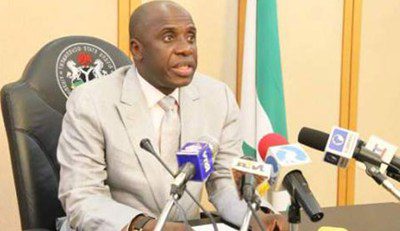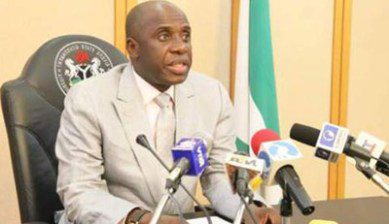Political Issues
Will politics of blackmail help Nigeria? -By Clement Udegbe

Since Boko Haram started in Nigeria around 2009, fear and blackmail have remained the main planks for their growth, and expansion. Politicians, especially those from the north, birthed and nurtured violence, in the name of Boko Haram as an instrument of blackmail in order to wrest power from the hands of the South of Nigeria. These men, as experienced and knowledgeable as they are in Nigerian politics, think that the killings would force Nigerians to give them power. Their hope is that insecurity could be used to pull GEJ out of power, through blackmail, and as much as this style has continued to fail, they will neither give up, nor change.
When then Chief of Army Staff, Gen.Ihejirika Rtd, came out with a plan to flush out the insurgents, politicians from the north east of Nigeria, pulled a heavy campaign of blackmail against him. They threatened to drag him to the ICC, backed with biased foreign media, and stopped that well planned onslaught against Boko Haram.
Today, the violence, has blossomed into a full scale war in the north east, with much more greater casualty records than we would have known had the Ihejirika onslaught been allowed. While these politicians and stakeholders dilly dallied, elements from Libya, and other fringe terrorist groups infiltrated Boko Haram, took control, and under the watch of these politicians, in less than three years, started with killing Christians, non-Muslims and foreigners in Borno State, in 2009,metamorphosed into a purely terrorist group which snowballed out of the control of its creators in the north. Boko Haram has grown so rapidly that they have our Chibok Girls, and are creating caliphates here and there, in the north. Yet, the lessons from the combined roles of the military and civilian JTF in checking the spread of Boko Haram, which is that it is only the indigenes’ active participation that can stop the menace in these areas are lost on these stake holders who have continued to play the loosing blackmail game, to get power in 2015.
Boko Haram has sponsors in Nigeria known to some genuine Nigerians, not the blackmailers and distractors from the north, but the concern here is that GEJ is not exposing these men to the shame they deserve, and that is encouraging their blackmail campaigns.
The approach of some of our big elder statesmen to the Boko Haram challenge, has not only helped the blackmail game, but has also fueled indiscretion in the language and conduct of some younger and prominent politicians in the opposition APC. The letters from our beloved former President, OBJ, provided some of these younger politicians the plank to throw caution and decency to the winds. Like the proverbial adolescent, who uses his feet to blow open doors, because his father sent him to steal, some of these politicians have taken the black mail to unacceptable and unfortunate height in their quest for political fortunes.
For example, after the President had invited the House to seat for some special assignments, it was Speaker Aminu Tambuwal’s comment, to the effect that he would report for his duties at the House of Representatives, with thugs that must have triggered the wrong reaction from the Police, which led to very dishonourable act of fence climbing by law makers, all in a bid to pre-empt a non-existent plan to impeach the Speaker. The law makers’ action of climbing the fence, which ought to have been condemned by decent Nigerians have been praised instead, by Prof. Wole Soyinka, the Nobel Laureate, and has left many to wonder if there could be any standards of conduct by Nigerian politicians. No wonder they say politics is a dirty game, because the players have no standards of conduct in our country! But it all adds up to the blackmail game, by the opposition party the APC, their supporters and sympathizers. To buttress this point, Governor Rotimi Amaechi of Rivers State, in a recent event by the APC, took the ‘game’ to an absurd level when he was quoted as saying that APC will form a parallel government if they failed in the 2015 election! These men, have private Jets, unimpeded access to travel outside Nigeria, where they will run to should the nation explode, while the commoners will stay here and face the smoke. This is why it is high time these men know that their soap box invectives will not be taken seriously by discerning Nigerians. In fact, their vituperations against this nation, will count against them in the coming 2015 polls.
Almost all the opposition APC presidential aspirants have at one time or the other told their audiences that Boko Haram will stop if voted into power come 2015. It is such a hopeless lie and mis-information to the electorate. It means either that these men know who Boko Haram is and have control over it, or that they do not not really appreciate the import and purpose of Boko Haram in Nigeria.
If Boko Haram was about Buhari, Kwakwanso, and Atiku, they would have sparred attacks in Kaduna, Kano, and Adamawa States, and Buhari would not have been attacked.
If it was about APC, and Muslims they would not have attacked mosques and Muslim prayer grounds across the North East. None of these men can therefore stop Boko Haram. In fact, Boko Haram will spread faster, if they ever get into power in 2015, because they have a poor knowledge and assessment of it. They are blackmailers!
Boko Haram desires to control Nigeria and rule it under their own peculiar standards of the Sharia Laws, which are completely different from what these opposition politicians, who are only playing the blackmail game to get power.
APC has not told Nigerians what they will do to stop the menace, except to keep shouting “change” at every corner. A change for the sake of change, without purpose and plan is not what Nigerians need now.





















